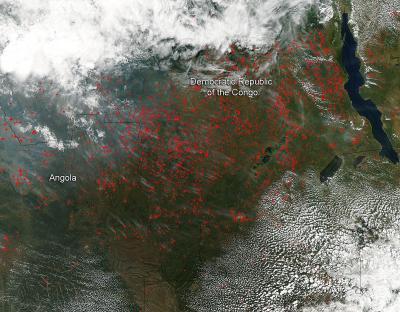It is currently the dry season in the Democratic Republic of the Congo and the Moderate Resolution Imaging Spectroradiometer (MODIS) on NASA's Aqua satellite captured this image on May 24, 2014. MODIS detected hundreds of active fires (location marked in red) in the Democratic Republic of the Congo and northeastern Angola, a sign that the agricultural burning season is underway.
Agriculture is responsible for more than half of the products produced by the Democratic Republic of the Congo, and fire is a central feature in agriculture across most of Africa. Places where traditional plots of open land are not available because the vegetation in the area is dense are the places where "slash and burn" agriculture is practiced most often. These regions include parts of Africa, northern South America, and Southeast Asia, where an abundance of grasslands and rainforests are found. Farmers often use fire to return nutrients to the soil and to clear the ground of unwanted plants. Fire is also used to drive game and grazing animals to new locations and to stimulate new growth in pastures. This annual burning has taken place for hundreds, possibly thousands of years, and it is not necessarily immediately hazardous. But it can have a strong influence on air quality and public health, as well as on climate and natural resources.

It is currently the dry season in the Democratic Republic of the Congo and the Moderate Resolution Imaging Spectroradiometer (MODIS) on NASA's Aqua satellite captured this image on May 24, 2014. MODIS detected hundreds of active fires (location marked in red) in the Democratic Republic of the Congo and northeastern Angola, a sign that the agricultural burning season is underway.
(Photo Credit: NASA image courtesy Jeff Schmaltz LANCE/EOSDIS MODIS Rapid Response Team, GSFC.)
Source: NASA/Goddard Space Flight Center